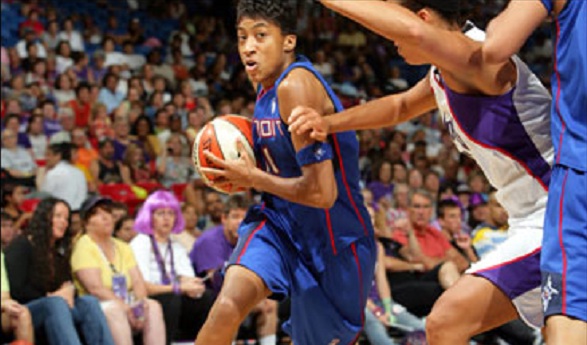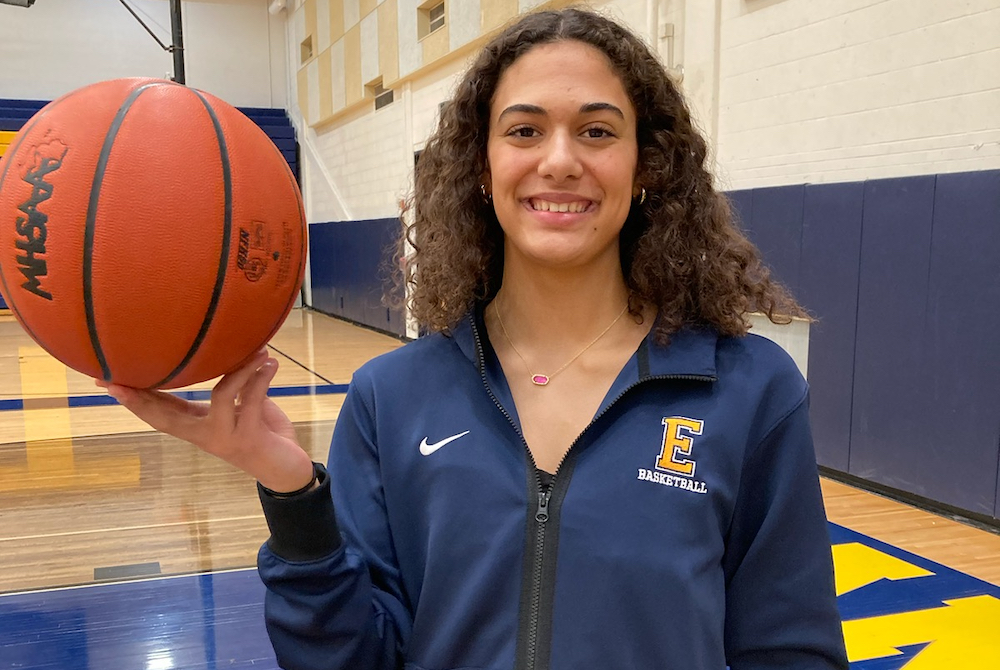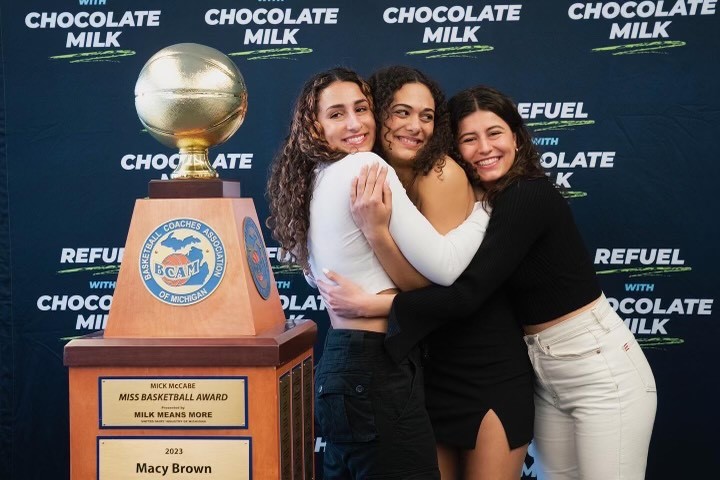
Right Where She’s Always Been
January 3, 2013
By Rob Kaminski
MHSAA benchmarks editor
It was between seasons for WNBA player Stacey Thomas. She sat in her Northwestern University basketball office, where she worked as the Wildcats' director of basketball operations, and listened to a message that she’d heard somewhere before.
“It was before a game in 2004, when an official for that night’s game – Marvin Sykes – stopped into my office and was chatting up officiating,” Thomas recalls. “He gave me recommendations for different associations, and various contacts, and that's when I actually registered and started reading rules books and studying mechanics.”
Suffice to say, basketball was her life. From her days as a prep standout at Flint Southwestern to a brilliant career at the University of Michigan, and ultimately to the sport’s pinnacle with a six-year career in the WNBA, Stacey Thomas had achieved hoops success beyond her wildest dreams.
Yet, it was two instances off the court – mere blips among the thousands of chance meetings and casual introductions in one’s lifetime – which steered Thomas where she is today. Ironically, it’s still on the basketball court.
The conversation with Sykes was the second moment, and it struck a familiar chord with a message she had heard years earlier as a collegiate player in Ann Arbor.
“The first time I ever thought about officiating was when I was playing at the University of Michigan. A little bug was put in my ear during the preseason when officials come in to talk about officiating, the rules changes, how the game is going to be called; that sort of thing,” Thomas recalls. “It was Patty Broderick (professional and collegiate official who currently serves as Coordinator for the Women's Basketball Officiating Consortium). And at end of that talk she told us how officiating could be a great career and a way to stay in the game.”
In the short term, however, Thomas had other ways to stay in the game. You could even say, she stole her way into extending her playing career. As a Wolverine, Thomas set a Big Ten Conference record with 372 career steals, 157 more than any player in U of M history. Her 1,556 points rank fifth in the Wolverine books.
Those numbers and her work ethic led to six seasons in the WNBA, highlighted by a championship with the 2003 Detroit Shock. Thomas played 175 games over six seasons with four teams. And, when her days in “The League” were done, Thomas’ skills took her overseas to stints in Sweden, Turkey and Latvia over three years.
All the while, however, Thomas had her sights set further down the road, for when the game stopped. As it turns out, it hasn’t stopped at all.
“As the years went by and I decided I was done playing, I thought about what I really wanted to do. I knew I wanted to stay in basketball,” Thomas said. “I was an assistant coach at Central Connecticut State in 2004; it was a good experience, but I liked the administrative job at Northwestern better.”
And, of course, there was always that officiating thing she’d heard about.
“While I was looking, I thought maybe I needed to really explore the officiating option,” Thomas said, and she now enters her sixth year as an MHSAA registered basketball official. “As involved as I was with basketball, it gave me the opportunity to stay in the game and be surrounded by the game. It’s a source of pride, and for me it’s the ongoing concept of getting it right and always striving to be better. I want to be professional, set goals and be the best official I can be.”
In other words, she approached officiating in the same manner she attacked opponents on the basketball floor. It’s still the game she’s known her whole life, just from a different perspective.
“As a player, I was around a lot of different coaches and a lot of different teammates, and they all have their own personalities. Understanding that really helped in the transition to officiating,” Thomas said. “You learn to pick your battles and to take things in stride. You can't take things personally. Some coaches try to rattle you by being vocal and boisterous, and others are sarcastic and joking. As a player or as an official you have to read personalities. Playing the game helped me learn how to react, speak to them, and communicate.”
At times, her fame comes into play as well. It’s not easy to hide when officiating in the same state where Thomas’ star began to rise, and coaches often remind her that she used to be on the floor reacting to, rather than blowing, the whistle.
“I am a very laid-back individual, and it takes a lot for me to get rattled, so I use that to my advantage. I might hear from certain coaches, ‘Come on, you played in The League; they didn't call that in The League,’” she laughs. “I just take it for what it is, whether they are trying to get under my skin, or be humorous. I know as an official to just let them have their say.”
The former prep all-stater who finished second in Michigan’s “Miss Basketball” voting as a senior in 1995, also was a three-time high jump champion and ran cross country at Southwestern. She hasn’t totally left track and field behind either, as she is a registered track & field/cross country official with the MHSAA as well.
Thomas, who now resides in Novi, regularly works boys and girls high school basketball in the Metro Detroit Area, and runs on Michigan’s community college circuit and at the NAIA level in the Wolverine-Hoosier Athletic Conference. The competitive fire that drove her as a player transfers to her uniform in stripes, as she eventually hopes to land NCAA Division I assignments.
“My playing experience helped me learn that you’ve got to pay your dues. You’ve got to work hard and have patience,” Thomas said. “I know that there are plays I have to still see over and over and over, so I will get them right on a consistent basis. I need to get to the camps, continue to learn the rules book, and my time will come. The more games, the more reps, the more situations, the more you learn.”
It’s a quality and regimen she tries to impress upon up-and-coming officials, and she also expresses that it’s important the many benefits of officiating aren’t lost in the quest for top games.
“I’ve developed so many friendships and made so many friends by getting into officiating. What better way to have an impact on a sport?” Thomas asks. “I tell people to have fun, enjoy it and work hard. Most of all, I always tell them being compensated is a bonus for doing something you love to do.
“Sometimes the younger officials get too caught up in what other officials are doing,” she continued. “Who’s got the big games, the pay rates, and so on. I played in The League, and I knew going in I wouldn't just come in and have the best games. You’ve got to put the time in.”
Thomas has noticed impatience not only among young officials, but in the playing ranks as well.
“On certain levels, the speed and physical nature of the game has increased,” she said. “There’s all this talent, but at the same time the players have become a little bit lazier compared to back in the day. Years ago, kids had more passion for the game, because nothing was given to them. They were better listeners to coaches, peers and parents.”
When Thomas shares the floor with today’s high schoolers, they are definitely getting her best effort and maximum attention. She understands what’s at stake, and what the high school game is all about. It’s why she accepts games nearly every night of the week during the season, and why she relishes those weeknights in the gyms.
“First of all, it's a special time in their lives, and it’s their turn to shine and to play at a high level and to be seen by their classmates and by the community,” Thomas says. “There’s nothing like that seven o’clock rivalry game, with a big crowd packing the gym, and it’s a close game and you are right there in the fire. It’s an adrenaline rush that pumps you up. Those are the games you strive for.”
Thomas has been on the floor for plenty of those games, and will have countless more in the future. That’s what makes it most special to know where she was this June when she could have been elsewhere. Thomas spent some time at the Healthy Kids Club in Detroit, helping director Mariah Lowson with basketball leagues for kids who ranged from 8 years old to high school age. Officials paid $20 to attend the camp and gain experience that will help them down the road. It certainly doesn’t hurt to see someone there like Thomas helping out.
“The nice thing is, it’s younger kids in the league, so young officials would not be intimidated,” Thomas said. “The motivation for them is to do well in these games, understanding that they can make money doing peewee leagues while continuing to learn. There were some kids as young as 13 or 14 years old, up to 17 years old, working games.”
And there was Thomas, right on the court as she’s always been.
PHOTO: Stacey Thomas drives to the basket as a member of the WNBA's Detroit Shock.
NOTE: This is the seventh installment in the series "Making – and Answering – the Call" detailing the careers and service of MHSAA officials. Click the links below to view others or the blue "Officials" tag at the top of the this story for the entire series plus other Second Half coverage on the subject.

Step by Step, EGR's Brown Climbs to Miss Basketball Award, College Future
By
Steve Vedder
Special for MHSAA.com
March 16, 2023
EAST GRAND RAPIDS – Macy Brown remembers spending her Saturday mornings with her older sisters scrambling around gymnasiums when she was no older than a first grader.
The long and winding journey from those early days to a sterling career at East Grand Rapids is one chronicled by overcoming the gangly body of a middle schooler, surrendering interest in two other sports in favor of basketball, countless hours of AAU, critical advice from two older sisters, a misfortunate accident to a teammate as a junior that necessitated a position switch and eventually to sorting through scholarship offers from a handful of elite college programs.
It's a path that concluded this week with the Pioneers’ point guard not only becoming one of just 1.3 percent of high school players to accept a Division I scholarship, but also being named winner of the prestigious Miss Basketball Award as the state's top senior player.
It's a long way from those weekend mornings to becoming the school's all-time leading scorer, a four-year starter, all-stater and Miss Basketball winner – and a story that Brown says exceeds anything she could have imagined.
"It's been amazing, magical at times," Brown said. "You don't realize how you've spent your time until it's over. There were a lot of sacrifices, but you also gain so much with the relationships you've had through basketball."
The journey started at the East Hills center in Grand Rapids with older sisters Oliva and Jillian, both of whom are currently playing Division I college basketball, and their mother Noelle, who ran an AAU program. It was the first time Macy Brown recalls taking an interest in the sport and began taking stock of what it would take to play basketball at the high school or possibly even college level.
By the time Brown entered middle school, she was all of 5-foot-9 with skills that while encouraging, were far from a guarantee that a long basketball bloodline would be extended by one more daughter. In fact, it was the first time Brown was spotted by EGR coach Troy Hammond, who recalls her as anything but the player who would become the program’s all-time leading scorer with 1,537 points while starting all 86 of the team's games over four varsity seasons.
"She was a tall, lanky kid who was just figuring her body out," Hammond said, "She was a tag-along with her sisters. She was always smiling, a happy-go-lucky kid who loved being in the gym. But I would be lying if I said she would be as good or better than the experiences I had with her sisters. That was no foregone conclusion."
Still, Brown stuck it out and slowly made progress, both mentally and physically. Boosted by advice from her sisters, Brown's on-court talent began to take shape. She also grew about three inches and began hitting the weight room to gain strength. As she entered middle school, she elected to give up lacrosse and soccer to spend more time playing basketball. Armed by having additional time for basketball, she threw herself into even more AAU ball. College coaches who constantly mine the AAU circuit for emerging talent began to notice Brown, who received her first scholarship offer from Loyola of Chicago following her eighth-grade season.
 Despite the interest, however, Brown knew she had to become a better player.
Despite the interest, however, Brown knew she had to become a better player.
"I was pretty good, but you don't realize how big of a leap it is from middle school to high school," said Brown, who had no second thoughts about becoming a single-sport athlete. "I grew up around basketball, it was always my first sport. I couldn't see playing lacrosse or soccer past high school."
Brown was good enough to make EGR's varsity as a freshman, She averaged 11.7 points per game in her inaugural season and gained additional attention from playing on a 22-1 team that would have been in contention for a Division 1 title if the season hadn't been cancelled because of COVID-19.
Brown continued to hone her game, averaging 13.5 points as a sophomore. She made all-conference for a second time and also made her college choice: she would become a Michigan Wolverine.
"When you know, you know," she said. "I knew I would wind up at Michigan because when I went other places, I would always compare them to Michigan. It just felt like home."
Brown said she relied on her sisters to know what required her utmost attention during the recruitment period. Olivia started at St. Bonaventure and now plays at Valparaiso, while Jillian is at Northwestern. Both offered crucial advice on how to pick a school.
"It definitely helped playing against them. I would get beat on, but it helped me," Macy said. "It was all for the best because it helped me become a better player."
It was after picking her college that Brown's career took another significant step forward. The Pioneers' senior point guard, Ally Carlson, who now plays at Western Michigan, suffered a season-ending ACL injury before senior-year practice began. The injury meant Brown, who had been a shooting guard her first two seasons, would have to move to point. She had to transition from becoming the team's second or even third offensive option to someone counted on to score points. She responded by averaging 22.4 as a junior and tossing in 25 points per game this season.
"I watched her develop into a leader, both as a person and on the court," Hammond said. "To see that development as a coach, it was wonderful."
Brown's improvement as a player included serious self-reflection. She admits to being the kind of athlete who maps out goals and then isn't satisfied until she reaches them.
"Every year was a checkpoint for me," she said. "I worked hard every offseason, and I would always notice what it took to play the game."
While the book on her high school career closes with the Miss Basketball Award, another door is opened in Ann Arbor. Brown said if she were to speak to a room full of young basketball wannabes, her advice would be simple. Brown was once in their position, and better than anyone else knows what it takes to conquer the next step in moving up the basketball ladder.
"It's definitely step by step, and you have to learn from your experiences," she said. "You make sacrifices, but you can gain so much."
PHOTOS (Top) Macy Brown is this season's Miss Basketball Award winner. (Middle) Brown and her sisters celebrate her award this week. (Top photo by Steve Vedder. Middle photo courtesy of the East Grand Rapids athletic department.)

